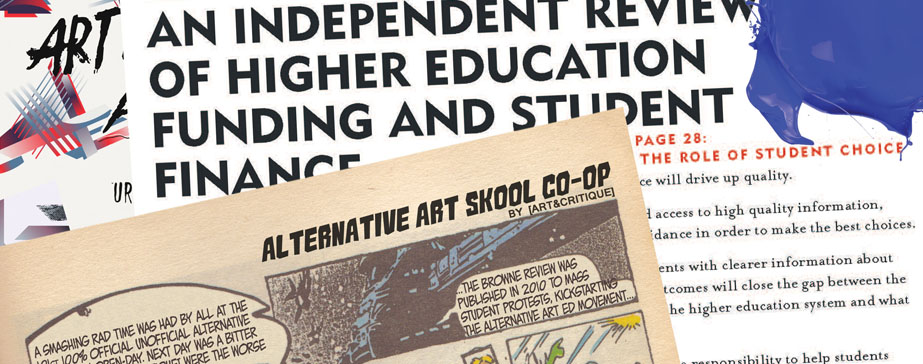
Radical Pedagogy Research & Reading Group
The Radical Pedagogy Research Group is a public forum and peer-led participatory action-research project on alternative art education, radical pedagogy and self-organisation, with the practical aim of developing a self-organised alternative studio programme. The reading group meets on the last Friday of every month, it is free and open to everyone who wants to join as long as they commit to the reading. We plan to organise additional workshops, screenings and other events that will emerge from our research. Please book your place and download the reading.
For more information and latest updates please visit the RPG homepage. For the draft reading list and an archive of previous events please scroll down.
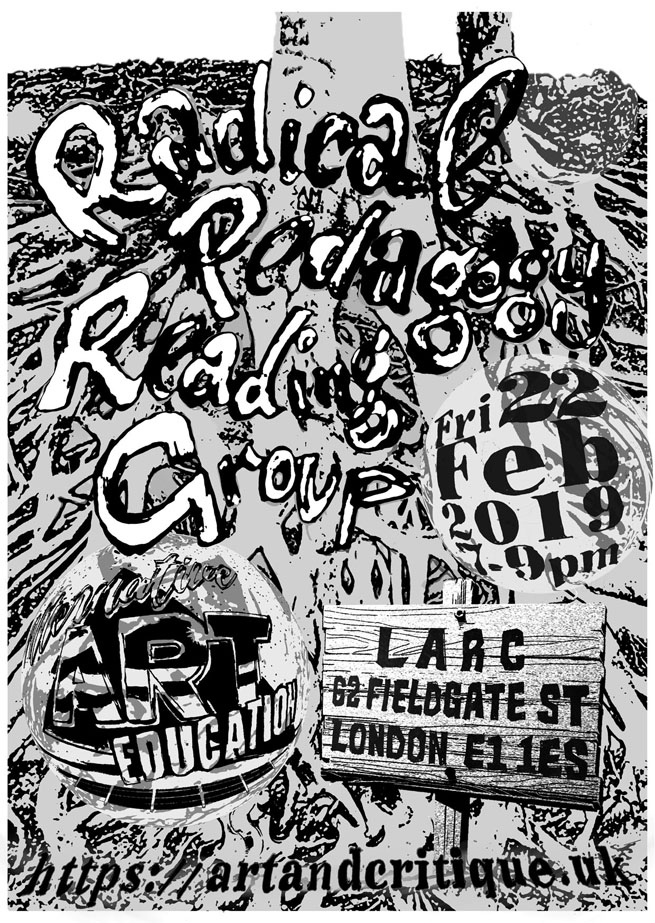
We compiled a syllabus with contributions collected via an open call and launched the Radical Pedagogy Reading Group in February 2019. The research group welcomes anyone who wants to join and collaborate with us to develop a self-organised alternative studio programme. This includes artists, researchers, tutors, students and anyone who wants to contribute to the objectives of the research project. The topics include but are not limited to the following in the context of alternative art education:
- critical pedagogy
- co-operative art education
- practice and theory
- epistemology and models of knowledge
- self-organisation in art practice and education
- peer-support groups
- collectivity and collaboration
- skills and de-skilling
- creative labour and precarity
- alternative economies in art and education
- neoliberalisation of art education
- reform of formal art education
- creativity
- modalities of art education
- the educational turn in art and curating
- institutional critique
Preliminary research on this project began in the summer of 2016 when we identified our research objectives, compiled a resource page on alternative art education and organised workshops and meetings on self-organisation and alternative art education.
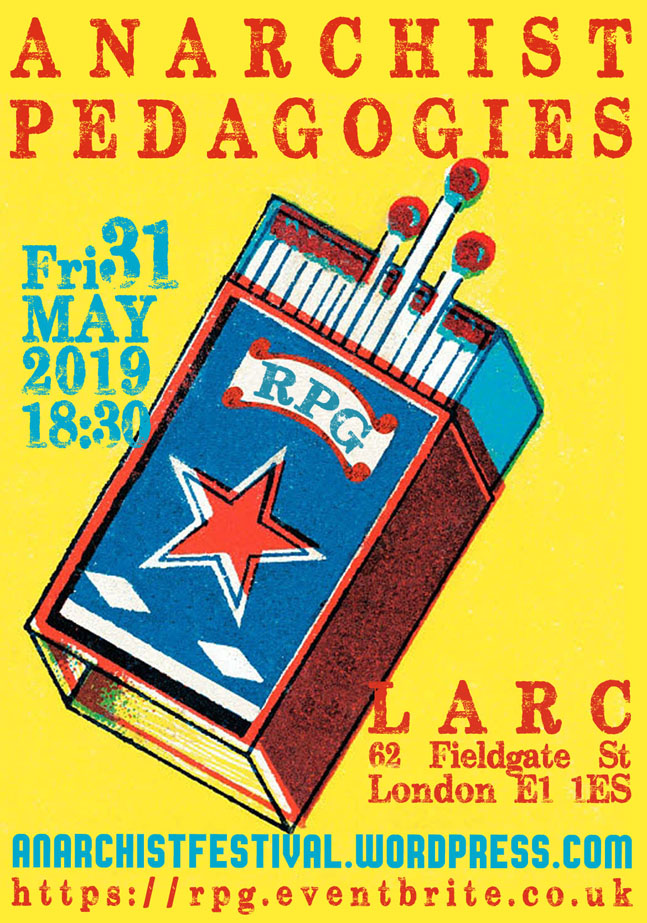
Fuelled by economic crisis, austerity and the liberalisation of higher education, alternative art education has burgeoned into a full-blown movement in the last decade. But what is alternative art education? Who is it for and what is it alternative to?
There are as many different formats and models of alternative art education as there are alternative art schools, but in what ways is alternative art education expected to be different from traditional art education? Should alternative art schools try to emulate accredited MFAs or are they expected to radically re-imagine art education? How should alternative art schools be organised, structured and funded? Should alternative art schools challenge art institutions and the art market?
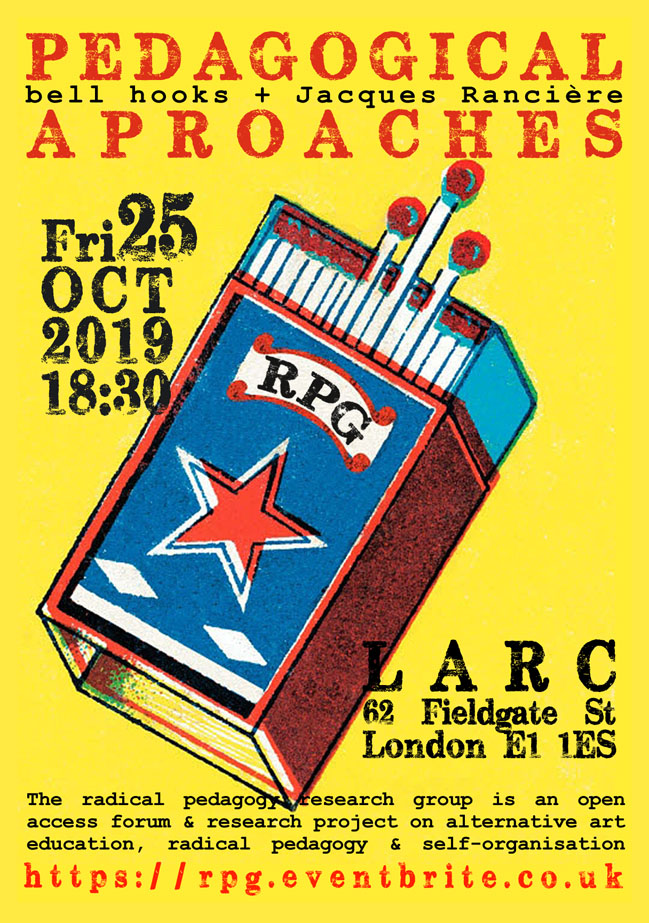
Pedagogical Approaches: bell hooks + Jacques Ranciere
Fri, 25 October 2019 18:30 – 21:00 BST
LARC, 62 Fieldgate Street, London E1 1ES
Booking via Eventbrite, suggested donation £2
A comparative discussion of emancipatory approaches to learning developed by Bell Hooks and Jacques Rancière. Please download and read the set texts in advance of the reading group.
- Bell Hooks (1994). Teaching to Transgress, Education as the Practice of Freedom, Chapter 1.
- Jacques Ranciere (1991). The Ignorant Schoolmaster, Five Lessons in Intellectual Emancipation, pp. 1-18.
Pedagogy of the Oppressed pt. 4
Friday, 27 Sep 2019, 18:30 – 21:00
LARC, 62 Fieldgate Street, London E1 1ES
Booking via Eventbrite, suggested donation £2
In the last part of the series on Paolo Freire’s Pedagogy of the Oppressed we will discuss the fourth and final chapter together with the section on theoretical struggle from Vladimir Lenin’s essay What is to be done? Please download and read the texts in advance of the reading group.
- Paulo Freire (1996/1968). Chapter 4. Pedagogy of the Oppressed. New York: Bloomsbury, pp. 125-185.
- Vladimir Lenin (1902). Engels on the Importance of the Theoretical Struggle. In What is to be Done? Marxists Internet Archive, pp. 11-15.
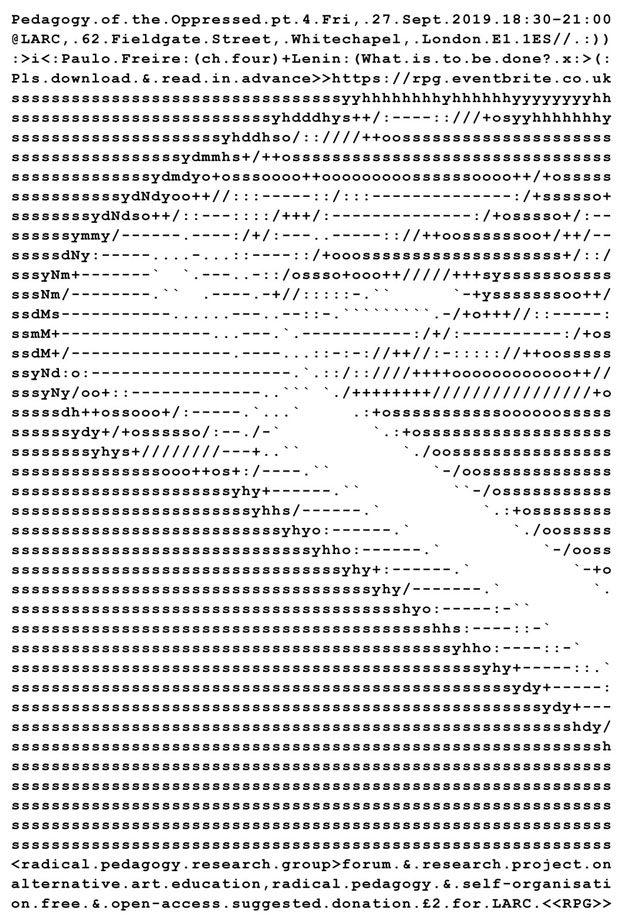
EVENT ARCHIVE
Radical Pedagogy Reading Group Launch
Friday, 22 Feb 2019, 7pm–9pm
LARC, 62 Fieldgate Street, London E1 1ES
What is alternative art education?
Sunday, 24 Mar 2019, 2-4pm
Ugly Duck, 49 Tanner St, London SE1 3PL
Alternative Art School Weekender 2019
Pedagogy of the Oppressed pt. 1
Friday, 26 Apr 2019, 7-9pm
LARC, 62 Fieldgate Street, London E1 1ES
Anarchist Pedagogies
Friday, 31 May 2019, 7-9pm
LARC, 62 Fieldgate Street, London E1 1ES
Anarchist Festival (31 May – 2 June)
Pedagogy of the Oppressed pt. 2
Friday, 28 June 2019, 7-9pm
LARC, 62 Fieldgate Street, London E1 1ES
Pedagogy of the Oppressed pt. 3
Friday, 26 Jul 2019, 18:30 – 21:00
LARC, 62 Fieldgate Street, London E1 1ES
SYLLABUS
#1 What is alternative art education? Who is it for and what is it alternative to?
- Koszerek, Pippa (2001). Independent Art School Conference. Journal of Visual Art Practice Vol. 1/2 (2001), pp. 111-115. A report on the concerns and ideas exchanged at the Independent Art School Conference, by organiser Pippa Koszerek. Starting off in 199 as a student protest in Hull, it evolved into a conference and curatorial project on the question of what an independent art school would look like.
- Koszerek, Pippa (2011). Alternative Art Schools. a-n The Artists Information Company. Research paper on the background to alternative arts schools and contemporary issues within art school education, particularly in light of the shift from student as learner to student as consumer, with case studies of alternative art schools.
- Ashill, Kathryn (2013). Symposium report: alternative art schools. a-n blog.
#2 What is radical pedagogy? Is radical pedagogy inherently decolonised? [TA] What can curatorial practice learn from radical pedagogy? [GG] Should RP only concern arts education or should arts education be situated in a broader educational system/overlap? [AW]
- Freire, Paulo (1996/1968). Pedagogy of the Oppressed. New York: Continuum. A founding text in critical pedagogy, it critiques the traditional “banking model of education” and argues for a radical reconceptualisation of learners and teachers as partners in the learning process. The book is composed of 4 chapters, we can read it over four sessions together with an excerpt from one of the texts that Freire cites in each chapter as follows: PART 1: Freire, Paulo (1996/1968). Chapter 1. Pedagogy of the Oppressed. New York: Continuum, pp. 43-69 + Hegel, Georg W. F. (1977). Lordship and Bondage. In Phenomenology of Spirit. Oxford: Oxford University Press, pp. 111-119. PART 2: Freire, Paulo (1996/1968). Chapter 2. Pedagogy of the Oppressed. New York: Continuum, pp. 71-86 + Sartre, Jean-Paul (2002/1939). Intentionality: A Fundamental Idea of Husserl’s Phenomenology, trans Joseph P. Fell. In The Phenomenology Reader, Dermont Moran and Timothy Mooney ed. London: Routledge. Originally published in Nouvelle Revue Francaise LII, Jan 1939 (one year after Edmund Husserl’s death). Sartre rejects traditional epistemologies and models of consciousness in favour of Husserl’s intentional theory of consciousness, namely that consciousness is always consciousness of something. PART 3: Freire, Paulo (1996/1968). Chapter 3. Pedagogy of the Oppressed. New York: Continuum, pp. 87-124 + Lukacs, Georg (1972/1922). Class Consciousness Parts 3 & 4. In History and Class Consciousness: Studies in Marxist Dialectics. Cambridge MA: MIT Press, pp. 59-70. PART 4: Freire, Paulo (1996/1968). Chapter 4. Pedagogy of the Oppressed. New York: Continuum, pp. 125-183 + Lenin, Vladimir (1902). Engels on the Importance of the Theoretical Struggle. In What is to be Done? Marxists Internet Archive, pp. 11-15.
- Grosfoguel, Ramón (2013). The Structure of Knowledge in Westernized Universities: Epistemic Racism/Sexism and the Four Genocides/Epistemicides of the Long 16th Century. Human Architecture: Journal of the Sociology of Self-Knowledge: Vol. 11/1, pp. 73-90. The article proposes that the epistemic privilege of Western Man in Westenized Universities’ structures of knowledge, is the result of four genocides/epistemicides in the long 16th century (against Jewish and Muslim origin population in the conquest of Al-Andalus, against indigenous people in the conquest of the Americas, against Africans kidnapped and enslaved in the Americas and against women burned alive, accused of being witches in Europe). The article concludes with a simple program which the author claims will change a westernised university into a decolonised pluriversity… [TA]
- Sternfeld, Nora (2010). Unglamorous Tasks: What Can Education Learn from its Political Traditions? e-flux #14, March 2010 (12 pages) The text considers the political, and often unglamorous and tedious aspects of education that need to be embraced in order to really incorporate critical education into curatorial practice and create spaces of shared knowledge production and reflection. [GG]
- CAST, a programme of the MIT rather than proposing a text, I am proposing to have a look at the MIT programme CAST, where artists, scientists and researchers work on projects together as an approach of interdisciplinarity leading to a broader outcome and more ‘creative’ solutions of very varied issues. [AW]
#3 Should alternative art schools try to emulate accredited MFAs or are they expected to radically re-imagine art education? In what ways is alternative art education expected to be different from traditional art education? Are alternative art schools expected to resist and reform institutional models of education and pedagogy?
- Kenning, Dean (2013). Towards a Critical Art School. What’s the Point of Art School? London: Central Saint Martins, 25 April 2013.
- Mabb, David and Suhail Malik (2017). Art Teaching: Dialectics of Practice and Theory. In Theory – Arts – Practices, Peter Sonderen and Marijn de Langen eds. Arnhem: ArtEZ Press, pp. 69-81.
- Ault, Julie and Martin Beck (2006). Drawing Out & Leading Forth. In Notes for an Art School, Florian Waldvogel, Anton Vidokle, Mai Abu ElDahab ed. Amsterdam: Manifesta Foundation. Looks at recent changes in art school education, addressing different pedagogical models and ideologies inherent within them.
#4 What pedagogical models and practices could play an important role in alternative art education? Can film be used as a radical pedagogic tool? [DO]
-
- Bogue, Ronald (2013). The Master Apprentice. In Deleuze and Education, Inna Semetsky and Diana Masny ed. Edinburgh: Edinburgh University Press, pp. 21-36. On Deleuze’s method of teaching, “The Deleuzian teacher, I hope to show, is both master and apprentice, a master apprentice engaged with the apprentice in their mutual apprenticeship in and thorough signs.” (p. 22) [NP]
- Parnet, Claire (2007). P as in Professor. In Gilles Deleuze from A to Z. Los Angeles: Semiotext(e). Video interview with Claire Parnet interviewing Deleuze. Deleuze speaks of his thoughts on teaching methodology. [NP]
- O’Neill, Deirdre (2017). Radical Pedagogy, Prison, and Film. Emerging from Inside Film, a project that helps prisoners and people on probation make their own films, this is a discussion of the need for working class people to represent themselves and challenge mainstream stereotypes and assumptions about them. This project gives prisoners and those on probation the technical skills necessary to make their own films and tell their own stories in order to counter the ways they have been misrepresented. Film and television are key means by which socioeconomically marginalized groups are classified according to hegemonic norms, such groups can undermine these misrepresentations through their use of the media. [DO]
- Spivak, Gayatri Chakravorty and Sarah Harasym eds. (1990/1985). Criticism, Feminism and the Institution: An Interview with Gayatri Chakravorty Spivak. In the Post-Colonial Critic: Interviews, Strategies, Dialogues, Sarah Harasym ed. New York & London: Routledge, pp. 1-16. On the importance of writing and the relationship between practice and theory.
- Semetsky, Inna (2009). Deleuze as a Philosopher of Education: Affective Knowledge / Effective Learning. European Legacy: Toward New Paradigms, 14:4, pp. 443-456.
#5 Can art be taught? What knowledge and skills do artists need?
- Beech, Dave (2014). Teaching the Unteachable. Art Monthly 377, June 2014, pp. 8-10 (3 pages). On the difference between teaching art and teaching the arts, republished as “How to Teach Art” on Dave Beech’s blog.
- Elkins, James (2001). Chapter 1: Histories. In Why Art Cannot Be Taught: A Handbook for Art Students. Illinois: University of Illinois Press, pp. 7-47 (40 pages).
- Elkins, James and Cornelia Sollfrank (2008). Art Education Is Radically Undertheorized. An interview with James Elkins by Cornelia Sollfrank. Dundee: Dundee Contemporary Arts, Visual Research Centre. James Elkins talks about different historical models of art education and his own experiences as art student and art teacher.
- Corris, Michael (2012). The Un-artist. Art Monthly 357 (Jun 2012).
#6 How can art education respond to the contradiction between traditional concepts of critical resistance and aesthetic transcendence on the one hand, and the commercial demands of the culture industry? How can alternative art education respond to the training requirements for the model of the artist as social irritant and the entrepreneurial model of the artist?
- Deresiewicz, William (2015). The Death of the Artist—and the Birth of the Creative Entrepreneur. The Atlantic, Jan/Feb 2015. Hard-working artisan, solitary genius, credentialed professional—the image of the artist has changed radically over the centuries. What if the latest model to emerge means the end of art as we have known it?
- Virno, Paolo (2009). The Dismeasure of Art: An interview with Paolo Virno, by Sonja Lavaert and Pascal Gielen. In Community Art: The Politics of Trespassing. Amsterdam: Valiz. Originally published in Open! #17 A Precarious Existence, 1 Nov 2009. Paolo Virno argues that art has been dissolved in society like an effervescent tablet in water. The arts have become an essential component of the post-Fordist production process and have to a large degree lost their autonomy.
- Gielen, Pascal (2012). Being an artist in post-Fordist times: Artistic strategies in post-Fordist times. Tasmanian College of The Arts Art Forum Lecture Series. Hobart: University of Tasmania. Video (MPEG) Available under University of Tasmania Standard License.
- Kahn, Nathaniel dir. (2018). The Price of Everything. TV-14, 1h 38min, Documentary (USA).
#7 How can alternative art schools address class, race and gender inequality in the arts? Does alternative art education attract participant diversity? [ZT]
- Kenning, Dean (2012). Refusing conformity and exclusion in art education. Mute (22 Mar 2012). Dean Kenning argues that art pedagogy can only be radical if it takes on the exclusions and market bias which are impoverishing educational culture. “There is, at the very least, a logical contradiction when art projects which claim to offer alternative models of education, fail to address the dominant corporate pedagogy that shapes the frame in which they operate.”
- hooks, bell (1994). Engaged pedagogy. In Teaching to Transgress: Education as a Practice of Freedom. New York: Routledge, pp. 13-22. bell hooks describes an approach in education where students can learn to transgress against racial, sexual, and class boundaries. She argues that teachers’ control and power over students teaches obedience to authority. She advocates collaborative learning and describes teaching as a performative act
- Tolstoy, Leo (2014/1898). Chapter V. In What is Art? Trans Aylmer. Maude Roads Publishing, pp. 46-52. Art has many, tangible guises, meanings and applications (for good and bad) and exposure to art and its study is fundamental to communicating with/understanding others and the world we live in. This text would open discussion about whether traditional art institutions are vibrant meeting places for people from different walks of life and whether subject cross-pollination – therefore different ways of seeing the world – are able to occur, and whether established power and hierarchy within them stifles social understanding. By addressing these questions, we can discuss what an alternative art education needs to provide and why. [ZT]
#8 How can alternative art schools address the structural inequality between learners and teachers?
- Ranciere, Jacques (2007). The Emancipated Spectator. Artforum 45/7 (March 2007), pp. 271-280.
- Plummer, Thomas G. (1990). Diagnosing And Treating The Ophelia Syndrome. Faculty lecture, Delta Phi Alpha, German Honor Society, 5 Apr 1990. Diagnoses the Ophelia syndrome as a state of dependence on authority. Ophelia does not have a mind of her own, especially when it comes to her own thoughts and feelings. Her father Polonius is only too willing to assert his authority and tell her what to think, discouraging her from thinking for herself. Plummer uses this relationship as a metaphor for what goes on in universities, workplaces and social contexts. He describes a series of different methods to overcome the Ophelia syndrome and maintain better relationships, develop self-confidence, live with uncertainty, question authority, think critically and take risks. On students’ agency. Could be read alongside Ranciere’s Ignorant Schoolmaster and the Emancipated Spectator, for a performative approach to the problem of inequality and disempowerment in education. Perhaps the exercises can be used as the basis of a workshop.
#9 How should alternative art schools be organised? Should alternative art schools be free, self-organised and inclusive? What would an artist to artist collaborative learning environment look like? What would its structure be, how would it function and what would its aims be as a community? [AM] How do we organise as artists? What is artistic organising? [GC]
- Forkert, Kirsten (2006). Artistic and political autonomy, or the difficulty and necessity of organizing artists. Chto delat? When Artists Struggle Together Special Issue. A short text that unpacks the importance and difficulty of self-organisation among artists.
- Lippard, Lucy (1970). The Art Workers’ Coalition: not a history. Studio International, November 1970, Vol. 180/927, pp. 171-174. Reflection on why the Art Workers’ Coalition failed.
- Watts, Jonathan (2015). There Goes the Neighbourhood. Page and Screen. Frieze, 26 Oct 2015 (17min). The film deals with gentrification in London over the years and offers an insight into how artistic communities or collectives use space collaboratively. I am suggesting these spaces, from the action of finding them, to taking up residency, to their operation exist as collaborative learning environments. Do you want to book a ticket? [AM]
- Elzenbaumer, Bianca and Caterina Giuliani (2014). Designers’ inquiry: Mapping the socio-economic conditions of designers in Italy. Ephemera Journal, 14(3), pp. 451-459. Highlights ways in which artist organising and artists as workers is central to building solidarities and new collectivities. Emphasising possibilities of resistance together through the recognition of exploitation. [GC]
- Oakley, Kate (2017). Artists as workers. A response to John Bellamy Foster. CUSP. Highlights ways in which artist organising and artists as workers is central to building solidarities and new collectivities. Emphasising possibilities of resistance together through the recognition of exploitation. [GC]
- Apostol, Corina L. (2015). Art Workers between Precarity and Resistance: A Genealogy. In Art Workers Material Conditions and Labour Struggles in Contemporary Art Practice, Minna Henriksson, Erik Krikortz & Airi Triisberg ed. Berlin: Lugemik, pp. 103-117. Highlights ways in which artist organising and artists as workers is central to building solidarities and new collectivities. Emphasising possibilities of resistance together through the recognition of exploitation. [GC]
#10 How should alternative art schools be structured and funded? How do alternative art schools get access to resources and what do they need to become sustainable?
- Freeman, Jo (1970). The Tyranny of Structurelessness. Updated version. Originally published in Second Wave vol. 2, no. 1 (1972), pp. 1-6. Classic text on the necessity for structure in self-organised groups. PDF includes Levine, Cathy (1974). Tyranny of Tyranny. Black Rose No. 1 (Autumn 1974). Equally influential response to Freeman’s Tyranny of Structurelessness.
- Jakobsen, Jakob (2013). Pedagogy of Negating the Institution. Metamute, 14 Nov 2013.
- Rogoff, Irit (2010). FREE. E-flux Journal #14 (March 2010).
- Manifesto Club (2008). Towards a Free Art School. Presented by Doug Fishbone, Serpentine Gallery Manifesto Marathon, 19 Oct 2008.
- Seeds for Change (2013). A Consensus Handbook: Consensus decision making for activists, co-ops and communities. Lancaster: Seeds for Change.
#11 Should alternative art schools challenge art institutions and the art market? How can radical pedagogy help us bring out arts practice outside art institutions? [YC]
- Quaintance, Morgan (2017). The New Conservatism: Complicity and the UK Art World’s Performance of Progression. e-flux Conversations.
- Foster, Sesshu (2015). How is the artist or writer to function (survive and produce) in the community, outside of institutions? East Los Angeles Dirigible Transport Lines, 10 July 2015.
- Lotringer, Sylvere and Nina Power (2009). Intelligence Agency. Sylvere Lotringer interviewed by Nina Power. Frieze, Issue 125 (Sep 2009). Sylvere Lotringer talks about art and the market, the failings of capitalism and how radical thinking can help us survive ‘the system’.
- Kaprow, Allan (1993/1971). The Education of the Un-Artist Part 1. In Essays on the Blurring of Art and Life, Jeff Kelley ed. Berkeley: University of California Press, pp. 97-109. I am interested in discussing on how radical pedagogy can question/exceed the existing concept of arts more within everyday context – How socio-politically engaging arts practice transform a nonart into an art. [YC]
#12 What can reinventing the politics of knowledge production mean for art education? Art school as an institution of the common? [HB] How can radical pedagogy challenge hegemonic understandings of knowledge? [AP] How is the lecture performance embedded in modes of neoliberal production and what kind of subjectivity does this entanglement foster in its practitioners? – Do these lecture performances draw on performative strategies to critique notions of knowledge as commodity? [CU]
- Neary, Mike (2010). Student as producer: A pedagogy for the avant-garde? Learning Exchange, 1(1), n.p. Neary’s work transformed by personal ideas on education (as knowledge production) as it calls to question many assumptions about how we value and what we value when we consider intellectual labour. It also calls to question the relationships and institutional forms normalised in education so I think pushes boundaries that are not always visible. It was hard to choose a piece that was the most useful as the ideas are spread out across different texts and took me a while to grasp. [HB]
- Boal, Augusto (2002). Games for Actors and Non-Actors. Trans Adrian Jackson, pp. 18-28. The text provides an introduction to Augusto Boal’s practice of Theatre of the Oppressed, which attempts to understand and transform structures of oppression from a perspective that treats body and mind as a whole. This questions the mind-body divide which has enabled many common understandings of what “knowing” means. [AP]
- Milder, Patricia (2010). Teaching as Art: The Contemporary Lecture-Performance. PAJ: A Journal of Performance and Art 33, no. 1 (Dec 2010), pp. 13–27. This paper connects the practice of the lecture performance to forms of alternative pedagogies. Viewing teaching as art, it lays out the entanglements of art education, knowledge production and political activism. My research concerns the lecture-performance as a pedagogical and artistic teaching tool to create the artist as a creative knowledge entrepreneur. Drawing on theories of neoliberalisation and Claire Bishop’s notion of ‘discoursification of art education’ (where artists are taught in the art of discourse rather than specific practical skills), I look at contemporary lecture performances as caught between alternative pedagogies and neoliberal institutional absorption. [CU]
#13 How do we express precarity and exploitation? [GC] Can alternative arts education create space for slowness/rest/wasting time within precarity? [KW]
- Wardrop, Alex (2014). A Procrastination. In The Para-Academic Handbook: A Toolkit for Making-Learning, Alex Wardrop and Deborah Withers ed. HammerOn Press, pp. 14-20. The text is about the need for breathing space to be built into the ruins of further education (and other forms of creativity and knowledge production) in order to survive and live well together. [KW]
- Verwoert, Jan (2008). Yes, No & Other Options, I can, I can’t, Who cares? Art Sheffiled 08: Yes, No, Other Options. [KW]
#14 How does art education produce social change? How can art practices and theories inform tactics for emancipation and individual and communal development? [ST] What would a cooperative art school look like?
- Blake, Charlie and Jennie Stearns (2015). Art, Resistance and Demonic Pedagogy, From Parasite Capitalism to Excommunication. In Arts, Pedagogy and Cultural Resistance: New Materialisms, Anna Hickey-Moody and Tara Page eds. London: Rowman & Littlefield International. pp. 79-93. The text is a collection of essays that explore how the material processes of art practices constitute a methodological tool for a pedagogy that aims to empower individuals and communities and consequently creates social change. The essays are case studies that reflect on the concept of new materialism applied to art education. [ST]
- Ridley, David (2017). Institutionalising critical pedagogy: Lessons from against and beyond the neo-liberal university. Power and Education, Vol.9(1) 2017, pp. 65-81. Looks at current debates on co-operative education, histories of independent working-class education and the free university movement, considering critical pedagogy in relation to higher education institutions.
- Seeds for Change (2015). How to set up a Workers’ Co-op. Leeds: Radical Routes.
- Co-operatives UK (2014). Multi-stakeholder Co-operative Model Rules. Co-operatives UK. A model for a co-operative owned and controlled democratically by a variety of stakeholders who wish to work together to achieve their shared interests.
#15 How do you bring a work of art to life as if it were a classroom? How can radical pedagogy help us to develop socially engaged art and participatory projects? [ST]
- Bishop, Claire (2012). Pedagogical Projects: How do you bring a classroom to life as if it were a work of art? In Artificial Hells, Participatory Art and Politics Spectatorship. London: Verso, pp. 241-274. Following Irit Rogoff, Claire Bishop draws parallels between the reconceptualisation of students as participants and spectators as producers, highlighting the danger for these practices to become co-opted into the neoliberal ‘knowledge economy’. Following Felix Guattari, she considers the cross-disciplinary or transversal ‘double ontology’ of pedagogical art practices as a potential critique of art and its institutions. This potential for Bishop, is dependent on the success of these projects in both artistic and social fields, with the necessity of revisiting, questioning and reinventing both, or risk becoming ‘edu-tainment’.
- Rogoff, Irit (2008). Turning. E-flux Journal #00 (Nov 2008). Irit Rogoff argues that the slippage between notions of “education”, “self-organized pedagogies” and “knowledge production” threatens to subsume the radical intersection of art practice and critical pedagogy into renewed forms of capitalist production, and specifically in the “knowledge economy”. Concerned that these practices are in danger of becoming a style and losing sight of their original intentions, she invokes Foucault’s notion of parrhesia (“free, blatant public speech”), as a model with which to approach the educational turn in art.
- Helguera, Pablo (2011) Education for Socially Engaged Art. New York: Jorge Pinto Books. I’m interested in finding out more about the relevance of radical pedagogy in collaborative community practices, including community arts and participatory art. [ST]
![[RPG]-banner](https://videomole.tv/wp-content/uploads/2019/07/RPG-banner-1038x576.jpg)